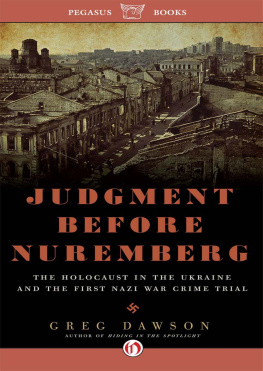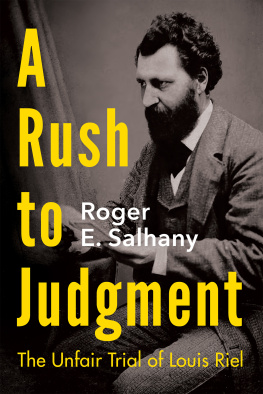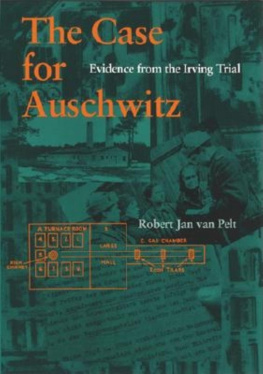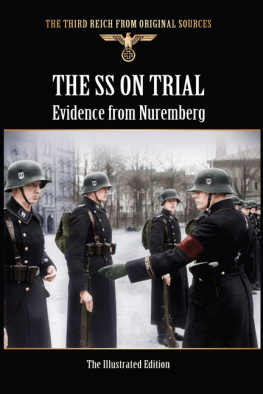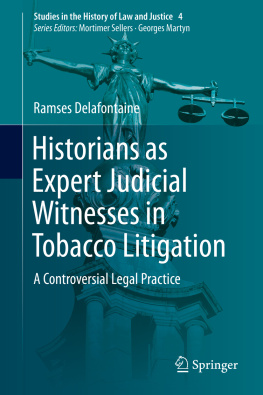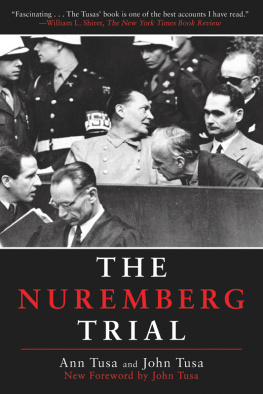
Mathew Turner teaches History at Deakin University, Australia, from where he gained his PhD, and is a member of its Contemporary Histories Research Group. He has been a guest scholar at the Jena Center for Twentieth Century History (Jena Center Geschichte des 20. Jahrhunderts), and postdoctoral fellow at the Centre for Holocaust Studies at the Institute for Contemporary History (Zentrum fr Holocaust-Studien am Institut fr Zeitgeschichte), both in Germany.
An important fresh perspective not only on the Auschwitz trial but also on the role of German historians in handling the Nazi past.
Jost Dlffer, Emeritus Professor of Modern History,
University of Cologne
The essential impulses that saw contemporary historians begin to engage with the topic of the murder of European Jews emerged from the judiciary. Mathew Turner reveals the benefits of this engagement and the critical role Fritz Bauer and the Auschwitz trial played for contemporary history and historiography. A rarely considered, but important connection, one that represents the precise focus of this study.
Professor Sybille Steinbacher, Director of the Fritz-Bauer-Institut
An outstanding piece of academic research distinguished by its distinctive approach, clear structure, originality, persuasive argumentation and skilful language. It offers new insights on the relationship between law and history and the collision between historical expertise and judicial norms.
Emeritus Professor Dr Konrad Kwiet, Resident Historian,
Sydney Jewish Museum

Published in 2018 by
I.B.Tauris & Co. Ltd
London New York
www.ibtauris.com
Copyright 2018 Mathew Turner
The right of Mathew Turner to be identified as the author of this work has been asserted by the author in accordance with the Copyright, Designs and Patents Act 1988.
All rights reserved. Except for brief quotations in a review, this book, or any part thereof, may not be reproduced, stored in or introduced into a retrieval system, or transmitted, in any form or by any means, electronic, mechanical, photocopying, recording or otherwise, without the prior written permission of the publisher.
References to websites were correct at the time of writing.
International Library of Twentieth Century History 122
ISBN: 978 1 78831 073 4
eISBN: 978 1 78672 479 3
ePDF: 978 1 78673 479 2
A full CIP record for this book is available from the British Library
A full CIP record is available from the Library of Congress
Library of Congress Catalog Card Number: available
Die Weltgeschichte ist das Weltgericht.
Friedrich Schiller, Resignation
Contents
List of Plates
Photographs courtesy of Alexander Klotz, Sachbearbeiter Fotografie, Sammlungen und Nachlsse, Institut fr Zeitgeschichte.
The Institut fr Zeitgeschichte began life in this building at Mhlstrae 26. Owing to its growth and limited space, the Institut moved to its current location, Leonrodstrae 46b, in 1972.
Paul Kluke (pictured here in the 1950s) became the somewhat reluctant IfZ General-Secretary in 1952 following the untimely, accidental death of Hermann Mau. It was under Kluke that the IfZ experienced an exponential growth in requests for Gutachten, the difficulties around which Kluke repeatedly made known at advisory board meetings.
Helmut Krausnick (pictured here in the 1960s) joined the IfZ in 1951, and succeeded Kluke as Director in 1958. Krausnick held this position until his retirement in 1972. In the context of West German historians as expert witnesses in Holocaust crimes trials, Krausnicks contribution to the 1958 trial of Einsatzkommando in Ulm was particularly significant.
Martin Broszat (pictured here in the 1970s) joined the IfZ in 1955, and succeeded Krausnick as Director in 1972. Broszat held this position until his death in October 1989.
Acknowledgements
The story of how this book came together could itself be described as a work of history, one spanning almost two decades. As multi-causal as any historical event, it would never have been completed without the time and support of many to whom I owe a debt of gratitude.
It seems apt to begin by thanking Deakin University for supporting me as an undergraduate and postgraduate over a cumulative nine-year period. The efforts of library staff in doggedly meeting every strange and wonderful request from me for material undoubtedly picking up some German along the way has been remarkable. The ongoing support of Deakin's Contemporary Histories Research Group is invaluable. Words are a totally inadequate means of conveying my deep gratitude and heartfelt thanks to three Deakin scholars in particular: David Lowe, Pam Maclean and Tony Joel.
Stumbling my way through first-year history in 1999, my very first lecture was given by the then cardigan-wearing Dr David Lowe. Twelve years later, the no longer cardigan-wearing now Professor David Lowe offered sage, sensible and timely advice throughout the course of this project. Pam Maclean is a very special individual to me, one who more than any other saw something in me resembling talent, and implored me to pursue postgraduate ambitions. Pam's advice shaped my historical apprenticeship immeasurably. I had never met Tony Joel prior to my return to Deakin in 2011. When it was revealed in my very first meeting with Tony that he, too, was a Richmond Tigers tragic from way back, our fates were sealed. A shared practice of Australian football masochism aside until, at least, the mutual savouring of the mighty Tigers ultimate victory in 2017 Tony's ability to complete his PhD and undertake extensive research in Germany during his candidature with young children in tow has remained a much-needed source of hope and inspiration. Tony, this one's for you!
Support from the Deutscher Akademischer Austauschdienst (DAAD) facilitated critical archival research in Germany in 201314. Deepest thanks to Norbert Frei and to the Jena Center Geschichte des 20. Jahrhunderts he directs for their long-standing support of this project and guidance over many years. Special thanks also to Jena Center colleagues Kristina Meyer, Daniel Stahl and Annette Weinke.
I have been overwhelmed by the willingness and generosity of eminent scholars in lending their time and support, including: Volker Berghahn, Hans Buchheim, Christoph Dieckmann, Randall Hansen, Isabel Heinemann, Peter Longerich, Jrg Osterloh, Lutz Nietkammer and Daniel Siemens. Particular thanks to Nicholas Berg, Jost Dlffer and Devin Pendas. I acknowledge the support of archivists Esther-Julia Howell (Institut fr Zeitgeschichte Mnchen), Annegret Neupert (Bundesarchiv Koblenz) and Werner Renz (Fritz-Bauer-Institut). Particular thanks to former Frankfurt prosecutors Gerhard Wiese and Johannes Warlo for their time and willingness to be interviewed for this project. For their detailed comments and helpful suggestions on an earlier draft, I would like separately to thank Ulrich Herbert, Konrad Kwiet and Dieter Pohl.
My gratitude to I.B.Tauris, and to Joanna Godfrey in particular for her interest in, enthusiasm for and ongoing patience with the development of this book.
Personal thanks are extended to Jacob Eder and Amandine Barb, Sarah Coates, Emma Grayson, Tatjana Schiwek and Eden Whittaker for their support, encouragement and friendship. Thanks are also extended to my many Deakin colleagues over the years, including but not limited to Rohan Bastin, Donna Frieze, Sam Koehne, Murray Noonan and Celeste Thorn.
Next page
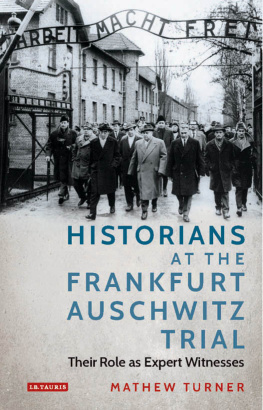
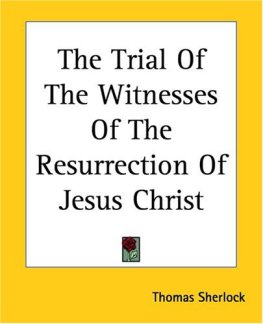
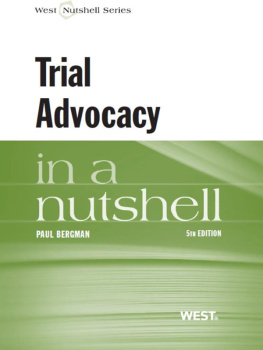
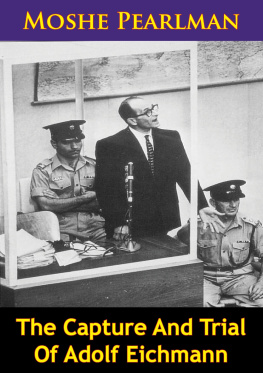
![Deborah E. Lipstadt - Denial [Movie Tie-in]: Holocaust History on Trial](/uploads/posts/book/373085/thumbs/deborah-e-lipstadt-denial-movie-tie-in.jpg)

